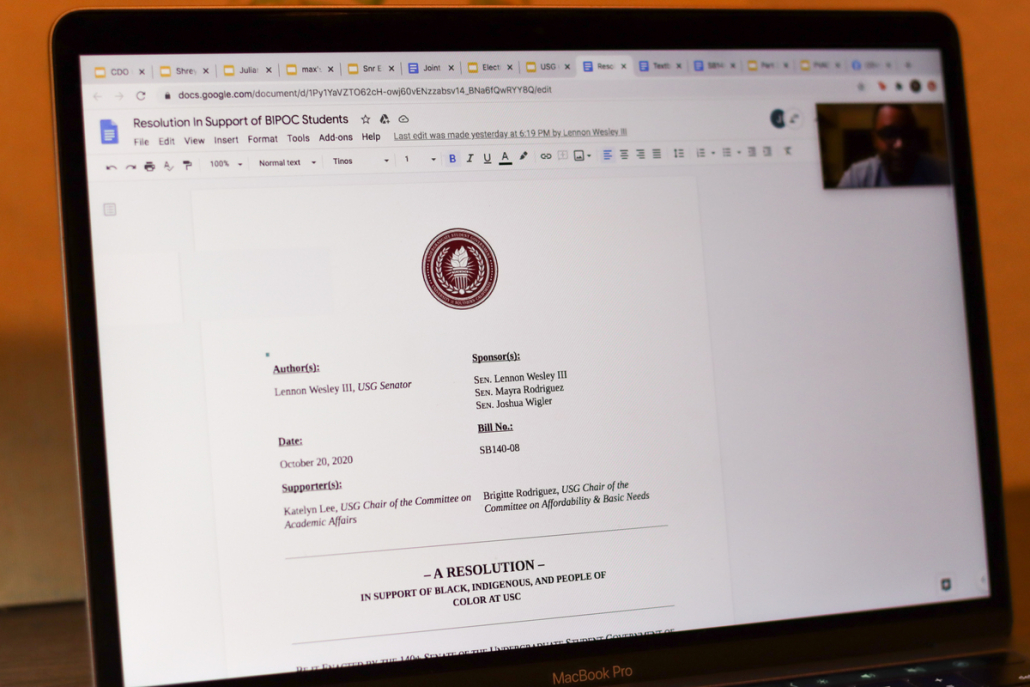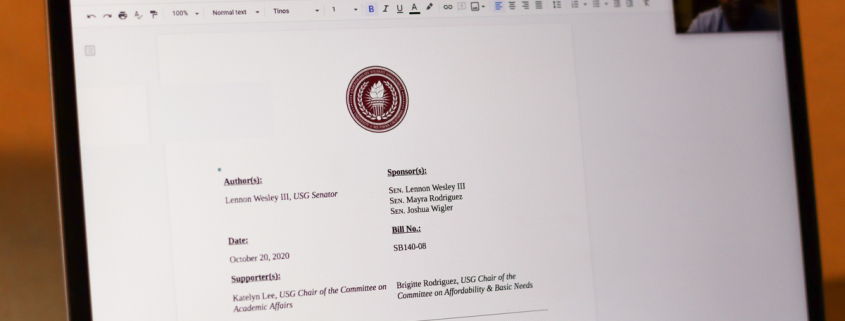USG presents resolution to support Black and Indigenous students and students of color

The Undergraduate Student Government presented a resolution Tuesday designed for Black and Indigenous students and students of color at USC. The resolution is meant to support marginalized students who attend the predominantly white institution and calls for the University to denounce “acts of discrimination and bias perpetrated” against them.
Created by Sen. Lennon Wesley III, the resolution states that with marginalized students making up 30% of USC’s incoming Class of 2024, the University has an obligation to “ensure these communities equitable opportunities for success in their education.” According to the Journal of Psychosocial Research on Cyberspace cited in the resolution, Black and Indigenous students and students of color have faced increased incidents of racism during online instruction.
“It genuinely pains me and genuinely hurts me to see a lot of things going on within our community … when it comes to BIPOC students, how they’re being treated,” said Wesley in an interview with the Daily Trojan. “There are certain actions that needed to be taken as soon as possible for us to really get to a place where we can appreciate everyone in our USC community … and I feel like that’s a little difficult for BIPOC students as of this moment.”
Although the “Stronger than Hate” initiative launched by President Carol Folt is meant to combat biases and discrimination in the USC community, the resolution calls for USC to partner with USG to create a separate campaign to address the discrimination and biases affecting Black and brown community members. The resolution also urges USC to increase awareness of resources such as the Office of Equity, Equal Opportunity and Title IX.
The resolution also calls on the University to acknowledge the experiences of low-income, Black and Indigenous students and students of color outside of cultural holidays or heritage months. Wesley said USC should also partner with local businesses and organizations that support Black and Indigenous people and people of color.
Katelyn Lee, USG’s cChair of the Committee on Academic Affairs, Katelyn Lee also submitted a resolution calling for the University and professors to provide financial transparency regarding the cost of textbooks and other course materials.
According to the resolution, students often refrain from purchasing textbooks from the USC Bookstore, with costs averaging around $1,200 for the academic year, because they often don’t know what materials they’ll need until the semester begins.
In an interview with the Daily Trojan, Lee also said the lack of communication between professors and the USC Bookstore has contributed to the issue of financial transparency due to instructors being unable to provide timely information on textbooks. To mitigate the issue, the resolution calls on USC to take active steps to ensure instructors provide information on required and recommended materials to the bookstore at least six weeks prior to the start of the semester and reflect the information on the University’s Web Registration site.
To remind instructors to provide this information, the resolution also looks to urge the Provost’s Office to send a memo eight weeks prior to the start of the semester to those who have not submitted their list of required or recommended materials.
“[Students are] left unaware of what books we’re required to purchase or rent for our courses until one to two weeks before the start of the course,” Lee said. “I [want] this resolution to bring more attention to this affordability issue and [hope] that instructors will increase their financial transparency so that students are able to minimize cost by viewing the books list ahead of time and then change their courses around, or at least have extra time to prepare for these costs, especially during this time when there’s more need due to COVID.”
Several members of the USG Senate also debated the appointment of ex-parliamentarian Andrew Fowler to the Senior Executive Aide role. Senators such as Sen. Julian Lin and Wesley respectively raised the issue of Fowler’s frequent absences at meetings and relationship with former Sen. Isabel Washington. Following text messages that revealed Washington and her colleague Nathaniel Manor — the former USG assistant director who would have succeeded Washington but was later barred from joining the Senate — engaging in racist and xenophobic rhetoric, Washington resigned in early July.
Despite the concerns, Fowler was approved with a 10 vote majority with two senators abstaining. Other appointments included students such as Anna Rodriguez and David Martinez for the Elections Commissions and Rohit Bolla and Jackie We for the Communications Department.
The Tenant Protections Resolution, created by USG Committee Chair for External Affairs Chris Perez and Graduate Student Government Director of External Affairs David Angel, passed unanimously. Through the resolution, USG will call on the Los Angeles City Council to consider policies that allow college students to cancel their leases and receive rent relief during the coronavirus pandemic.
While Angel knows the resolution itself will not change current policies, he told the Daily Trojan he hopes it will help pressure the city council to support students. Although conversations have begun with the council members, Angel also said USG looks to construct a petition and create a coalition of universities and colleges in Los Angeles to further incentivize the council to take action on the issue.
With the approaching spring semester, Angel also said they are looking to work with the University to be more transparent in its communication of reopening plans, which led many students to sign leases near campus expecting a hybrid education in the fall.
“Ultimately, the goal is to find some sort of avenue, whether it be at the university level, at city level or the state level, to help students get out of their leases, or at least take some of the burden off from housing insecurity,” Angel said after the meeting. “We’re just going to keep pushing until … we can actually change something to alleviate that burden on students.”

